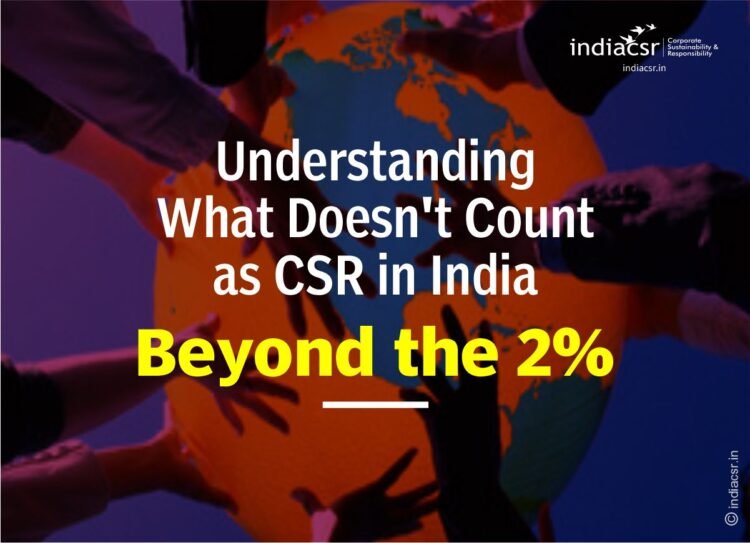Adhering to local laws and being a responsible corporate citizen is crucial for companies operating in India.

Corporate Social Responsibility (CSR) has become a significant aspect of business operations in India, thanks to the Companies Act 2013. The law aims to promote social welfare and sustainable development by mandating that certain companies allocate a minimum of 2% of their average net profits towards social development activities. However, it is vital to comprehend the scope of Corporate Responsibility and what activities fall outside its purview.
In this article, we delve into the intricacies of CSR in India, exploring what does not count as CSR and shedding light on the activities that do not qualify under the legal framework. By comprehensively understanding these exclusions, companies can navigate the CSR landscape more effectively and align their efforts with the intended objectives.
7 Elements Excluded from CSR
Here are seven key aspects that are not considered CSR under Indian law:
1. Contributions to political parties
Any direct or indirect contributions to political parties made are not deemed CSR activities. This exclusion is due to regulating political contributions under a different law, the Representation of People Act of 1951. For instance, if a company donates money to a political party during an election campaign or sponsors an event organized by a political party, these actions will not qualify as CSR activities.
2. Activities that exclusively benefit employees
CSR projects or programs designed solely to benefit company employees and their families are not considered CSR activities. CSR intends to encourage companies to undertake initiatives that serve the public rather than focusing on internal stakeholders. For example, if a company sets up a health clinic exclusively for its employees and their families or provides scholarships solely for the children of its employees, these activities would not be considered CSR.
3. One-off events
One-time events, such as marathons or awards, are not regarded as CSR activities as they lack a sustained impact. The term emphasizes the importance of companies engaging in projects or programs that have lasting benefits. Therefore, if a company organizes a marathon to raise awareness about a social cause or sponsors an award ceremony to honour individuals making significant societal contributions, these events will not qualify as CSR activities.
4. Activities within the normal course of business
Activities undertaken by a company as part of its regular business operations do not meet the criteria for CSR, as they primarily serve the company’s interests rather than the broader public. For instance, if a pharmaceutical company donates medicines to a hospital as part of its routine operations or a construction company builds a road as a regular business activity, these actions would not be considered as CSR.
5. Activities outside India
CSR activities must be undertaken within India to qualify as CSR. The emphasis is on encouraging companies to engage in initiatives that benefit the Indian public. Therefore, if a company sets up a school in a developing country outside India or provides disaster relief assistance in a foreign country affected by a natural calamity, these activities would not be considered CSR.
6. Compliance with other laws
Activities undertaken by companies to comply with other laws or regulations do not fall under the umbrella of CSR. CSR encourages voluntary actions that contribute to society rather than activities driven by legal obligations. For example, if a company installs pollution control equipment to meet environmental regulations or provides workplace safety training to comply with labour laws, these actions will not qualify as CSR activities.
7. Activities not specified in Schedule VII
The activities listed in Schedule VII of the Companies Act 2013 are recognized as CSR activities. Schedule VII defines the areas where companies can undertake CSR initiatives, and any activity outside these areas does not qualify as CSR. For instance, if a company sponsors a sports team unrelated to any of the activities specified in Schedule VII or sets up an art museum unrelated to the activities outlined in the Companies Act, 2013, these actions would not be considered CSR.
Conclusion
Companies can meet legal CSR obligations by understanding its requirements and pursuing activities that positively affect society.
While Corporate Social Responsibility (CSR) is a legal requirement for certain companies in India, companies need to understand which activities qualify as CSR and which do not. Activities such as contributions to political parties, those that exclusively benefit company employees, one-off events, activities within the normal course of business, activities outside India, activities driven by compliance with other laws or regulations, and activities not specified in Schedule VII of the Companies Act, 2013 do not qualify as CSR.
Adhering to local laws and being a responsible corporate citizen is crucial for companies operating in India. Companies can fulfil their legal obligations by understanding the legal requirements for CSR and engaging in activities that meet the CSR criteria while positively impacting society. Such endeavours enable companies to build trust with stakeholders and contribute to the country’s sustainable development.
About the Author

Nirbhay Lumde, Director – ESG, CGI Asia Pacific Global Delivery Centers of Excellence, and his views are personal. He is also the author of Corporate Social Responsibility in India: A Practitioner’s Perspective.
Views are personal.
Copyright @ India CSR





